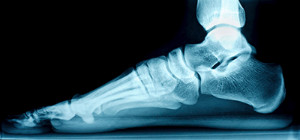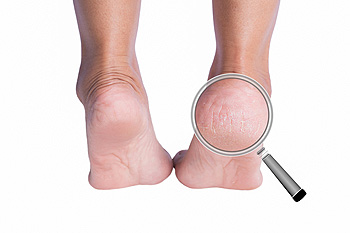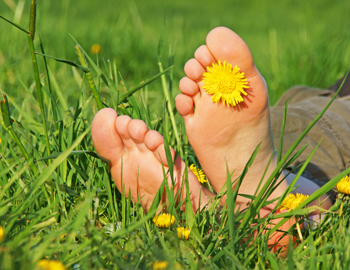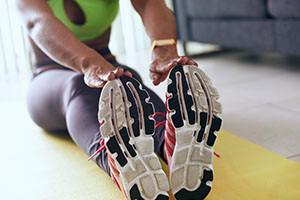
 Flat feet refers to the absence of an arch in the middle of the sole of the foot. While some people are born with and continue to have flat feet for their entire lives, others acquire flat feet over time. As you age, your arches can slowly collapse and cause your feet to become flat. This can result in an uneven distribution of your body weight across the surface of your feet when you walk, which might then lead to pain in your feet, calves, knees, hips, and back. If your flat feet are causing you pain or discomfort, then treatment may be necessary. Common treatments for this condition include wearing orthotic devices or specialized footwear and doing foot stretches to strengthen the arch. If you are experiencing pain from flat feet, it is recommended that you seek the care of a podiatrist.
Flat feet refers to the absence of an arch in the middle of the sole of the foot. While some people are born with and continue to have flat feet for their entire lives, others acquire flat feet over time. As you age, your arches can slowly collapse and cause your feet to become flat. This can result in an uneven distribution of your body weight across the surface of your feet when you walk, which might then lead to pain in your feet, calves, knees, hips, and back. If your flat feet are causing you pain or discomfort, then treatment may be necessary. Common treatments for this condition include wearing orthotic devices or specialized footwear and doing foot stretches to strengthen the arch. If you are experiencing pain from flat feet, it is recommended that you seek the care of a podiatrist.
Flatfoot is a condition many people suffer from. If you have flat feet, contact Dr. Stephan J. LaPointe from Georgia Foot & Ankle Specialists . Our doctor will treat your foot and ankle needs.
What Are Flat Feet?
Flatfoot is a condition in which the arch of the foot is depressed and the sole of the foot is almost completely in contact with the ground. About 20-30% of the population generally has flat feet because their arches never formed during growth.
Conditions & Problems:
Having flat feet makes it difficult to run or walk because of the stress placed on the ankles.
Alignment – The general alignment of your legs can be disrupted, because the ankles move inward which can cause major discomfort.
Knees – If you have complications with your knees, flat feet can be a contributor to arthritis in that area.
Symptoms
Treatment
If you are experiencing pain and stress on the foot you may weaken the posterior tibial tendon, which runs around the inside of the ankle.
If you have any questions please feel free to contact our office located in Rome, GA . We offer the newest diagnostic and treatment technologies for all your foot and ankle needs.
 The portion of tissue that is known as the Achilles tendon is located in the back of the leg, and connects the heel to the calf muscles. If an injury occurs to this part of the foot, it is often accompanied by severe pain and discomfort. An injury can happen for several reasons, including wearing shoes that do not fit correctly, suddenly twisting the foot while abruptly changing direction, and pursuing running activities without properly warming up or cooling down. A common symptom can include pain that is felt in the heel and back of the leg upon arising in the morning, and it may swell as the day progresses. Mild relief may be found when the activity that caused the injury is stopped, and it may help to wear custom made orthotics. If you have endured an Achilles tendon injury, it is strongly advised that you consult with a podiatrist who can properly diagnose and treat this condition.
The portion of tissue that is known as the Achilles tendon is located in the back of the leg, and connects the heel to the calf muscles. If an injury occurs to this part of the foot, it is often accompanied by severe pain and discomfort. An injury can happen for several reasons, including wearing shoes that do not fit correctly, suddenly twisting the foot while abruptly changing direction, and pursuing running activities without properly warming up or cooling down. A common symptom can include pain that is felt in the heel and back of the leg upon arising in the morning, and it may swell as the day progresses. Mild relief may be found when the activity that caused the injury is stopped, and it may help to wear custom made orthotics. If you have endured an Achilles tendon injury, it is strongly advised that you consult with a podiatrist who can properly diagnose and treat this condition.
Achilles tendon injuries need immediate attention to avoid future complications. If you have any concerns, contact Dr. Stephan J. LaPointe of Georgia Foot & Ankle Specialists . Our doctor can provide the care you need to keep you pain-free and on your feet.
What Is the Achilles Tendon?
The Achilles tendon is a tendon that connects the lower leg muscles and calf to the heel of the foot. It is the strongest tendon in the human body and is essential for making movement possible. Because this tendon is such an integral part of the body, any injuries to it can create immense difficulties and should immediately be presented to a doctor.
What Are the Symptoms of an Achilles Tendon Injury?
There are various types of injuries that can affect the Achilles tendon. The two most common injuries are Achilles tendinitis and ruptures of the tendon.
Achilles Tendinitis Symptoms
Rupture Symptoms
Treatment and Prevention
Achilles tendon injuries are diagnosed by a thorough physical evaluation, which can include an MRI. Treatment involves rest, physical therapy, and in some cases, surgery. However, various preventative measures can be taken to avoid these injuries, such as:
If you have any questions please feel free to contact our office located in Rome, GA . We offer the newest diagnostic tools and technology to treat your foot and ankle needs.
 Dry, flaky heels can be uncomfortable and unsightly. Common causes of this condition are walking barefoot, taking hot showers, being on your feet for prolonged periods of time, wearing ill-fitting shoes, and not drinking enough water. Exfoliating and moisturizing your feet can be done at home and may provide some relief. However, in more severe cases, a visit to the podiatrist may be warranted. If you have painful dry heels or notice deep cracks, bleeding, or signs of infection, it is suggested that you see a podiatrist for treatment.
Dry, flaky heels can be uncomfortable and unsightly. Common causes of this condition are walking barefoot, taking hot showers, being on your feet for prolonged periods of time, wearing ill-fitting shoes, and not drinking enough water. Exfoliating and moisturizing your feet can be done at home and may provide some relief. However, in more severe cases, a visit to the podiatrist may be warranted. If you have painful dry heels or notice deep cracks, bleeding, or signs of infection, it is suggested that you see a podiatrist for treatment.
If the skin on your feet starts to crack, you may want to see a podiatrist to find treatment. If you have any concerns, contact Dr. Stephan J. LaPointe from Georgia Foot & Ankle Specialists . Our doctor can provide the care you need to keep you pain-free and on your feet.
Cracked Heels
It is important to moisturize your cracked heels in order to prevent pain, bleeding, and infection. The reason cracked heels form is because the skin on the foot is too dry to support the immense pressure placed on them. When the foot expands, the dry skin on the foot begins to split.
Ways to Help Heal Them
Ways to Prevent Cracked Heels
If you are unsure how to proceed in treating cracked heels, seek guidance from a podiatrist. Your doctor will help you with any questions or information you may need.
If you have any questions, please feel free to contact our office located in Rome, GA . We offer the newest diagnostic and treatment technologies for all your foot care needs.
 Heel pain can often be uncomfortable, and may be indicative of existing foot conditions. A common cause of heel pain is plantar fasciitis, which occurs as a result of a damaged or injured plantar fascia. The plantar fascia is the portion of tissue that connects the heel to the toes, and it can cause severe pain and discomfort if it becomes injured. Additional reasons for heel pain to develop can happen from being overweight, or from standing for extended periods of time throughout the day. Additionally, wearing shoes that do not fit correctly may be a cause of heel pain. Children who participate in running and jumping activities may be susceptible to developing Sever’s disease, which is a condition that affects the growth plate in the heel. If you are experiencing heel pain, it is strongly suggested that you consult with a podiatrist, who can properly diagnose and treat any type of heel pain, as quickly as possible.
Heel pain can often be uncomfortable, and may be indicative of existing foot conditions. A common cause of heel pain is plantar fasciitis, which occurs as a result of a damaged or injured plantar fascia. The plantar fascia is the portion of tissue that connects the heel to the toes, and it can cause severe pain and discomfort if it becomes injured. Additional reasons for heel pain to develop can happen from being overweight, or from standing for extended periods of time throughout the day. Additionally, wearing shoes that do not fit correctly may be a cause of heel pain. Children who participate in running and jumping activities may be susceptible to developing Sever’s disease, which is a condition that affects the growth plate in the heel. If you are experiencing heel pain, it is strongly suggested that you consult with a podiatrist, who can properly diagnose and treat any type of heel pain, as quickly as possible.
Many people suffer from bouts of heel pain. For more information, contact Dr. Stephan J. LaPointe of Georgia Foot & Ankle Specialists . Our doctor can provide the care you need to keep you pain-free and on your feet.
Causes of Heel Pain
Heel pain is often associated with plantar fasciitis. The plantar fascia is a band of tissues that extends along the bottom of the foot. A rip or tear in this ligament can cause inflammation of the tissue.
Achilles tendonitis is another cause of heel pain. Inflammation of the Achilles tendon will cause pain from fractures and muscle tearing. Lack of flexibility is also another symptom.
Heel spurs are another cause of pain. When the tissues of the plantar fascia undergo a great deal of stress, it can lead to ligament separation from the heel bone, causing heel spurs.
Why Might Heel Pain Occur?
Treatments
Heel pain should be treated as soon as possible for immediate results. Keeping your feet in a stress-free environment will help. If you suffer from Achilles tendonitis or plantar fasciitis, applying ice will reduce the swelling. Stretching before an exercise like running will help the muscles. Using all these tips will help make heel pain a condition of the past.
If you have any questions please contact our office located in Rome, GA . We offer the newest diagnostic and treatment technologies for all your foot and ankle needs.
 There are many changes women endure during their pregnancy. The feet are generally affected, and swelling is a common ailment. This may be a result of various reasons, which can include an increase in leg pressure from the growing fetus, the development of flat feet, and the arch and ankle may become unstable. Additionally, hormonal changes may be responsible for hot and burning sensations that can occur in the feet. Many pregnant women find relief when their feet are frequently elevated, and it is beneficial to reduce sodium intake. If you would like more information about remedies that can help your feet to feel better during pregnancy, is it suggested that you consult with a podiatrist.
There are many changes women endure during their pregnancy. The feet are generally affected, and swelling is a common ailment. This may be a result of various reasons, which can include an increase in leg pressure from the growing fetus, the development of flat feet, and the arch and ankle may become unstable. Additionally, hormonal changes may be responsible for hot and burning sensations that can occur in the feet. Many pregnant women find relief when their feet are frequently elevated, and it is beneficial to reduce sodium intake. If you would like more information about remedies that can help your feet to feel better during pregnancy, is it suggested that you consult with a podiatrist.
Pregnant women with swollen feet can be treated with a variety of different methods that are readily available. For more information about other cures for swollen feet during pregnancy, consult with Dr. Stephan J. LaPointe from Georgia Foot & Ankle Specialists . Our doctor will attend to all of your foot and ankle needs.
What Foot Problems Can Arise During Pregnancy?
One problem that can occur is overpronation, which occurs when the arch of the foot flattens and tends to roll inward. This can cause pain and discomfort in your heels while you’re walking or even just standing up, trying to support your baby.
Another problem is edema, or swelling in the extremities. This often affects the feet during pregnancy but tends to occur in the later stages.
How Can I Keep My Feet Healthy During Pregnancy?
If you have any questions please feel free to contact our office located in Rome, GA . We offer the newest diagnostic and treatment technologies for all your foot and ankle needs.
 Patients who have diabetes are generally aware of the importance of maintaining proper foot care. There are specific types of foot conditions that diabetic patients can be prone to. These can include neuropathy, foot deformities, and poor circulation. Neuropathy can cause the inability to feel sensations in the feet, or the feet may tingle. It may be difficult to feel a wound, cut, or bruise if this condition develops. Poor circulation can cause a slower healing response to existing infections and cuts. It is beneficial to ensure blood sugar levels are controlled, in addition to inspecting the feet on a daily basis. Applying a good moisturizer may help the feet to remain smooth, and this can possibly prevent cracked heels and calluses from developing. If you have diabetes, it is strongly suggested that you are under the care of a podiatrist who can help you manage this condition.
Patients who have diabetes are generally aware of the importance of maintaining proper foot care. There are specific types of foot conditions that diabetic patients can be prone to. These can include neuropathy, foot deformities, and poor circulation. Neuropathy can cause the inability to feel sensations in the feet, or the feet may tingle. It may be difficult to feel a wound, cut, or bruise if this condition develops. Poor circulation can cause a slower healing response to existing infections and cuts. It is beneficial to ensure blood sugar levels are controlled, in addition to inspecting the feet on a daily basis. Applying a good moisturizer may help the feet to remain smooth, and this can possibly prevent cracked heels and calluses from developing. If you have diabetes, it is strongly suggested that you are under the care of a podiatrist who can help you manage this condition.
Diabetic foot care is important in preventing foot ailments such as ulcers. If you are suffering from diabetes or have any other concerns about your feet, contact Dr. Stephan J. LaPointe from Georgia Foot & Ankle Specialists . Our doctor can provide the care you need to keep you pain-free and on your feet.
Diabetic Foot Care
Diabetes affects millions of people every year. The condition can damage blood vessels in many parts of the body, especially the feet. Because of this, taking care of your feet is essential if you have diabetes, and having a podiatrist help monitor your foot health is highly recommended.
The Importance of Caring for Your Feet
Patients with diabetes should have their doctor monitor their blood levels, as blood sugar levels play such a huge role in diabetic care. Monitoring these levels on a regular basis is highly advised.
It is always best to inform your healthcare professional of any concerns you may have regarding your feet, especially for diabetic patients. Early treatment and routine foot examinations are keys to maintaining proper health, especially because severe complications can arise if proper treatment is not applied.
If you have any questions please feel free to contact our office located in Rome, GA . We offer the newest diagnostic and treatment technologies for all your foot and ankle needs.
 Many patients who enjoy the sport of running are often aware of the importance of preventing running injuries. When strength training and stretching techniques are frequently practiced, the likelihood of getting a running injury may be reduced. Research has indicated it is beneficial to warm up before and after running, and this can help to improve range of motion. This includes stretching the upper body, which may help to reduce existing weak spots. Many running injuries can be prevented when the time and mileage is gradually increased, and this can give the body time to adapt to successfully complete a training program. If you would like additional information how running injuries can affect the feet and how to avoid them, it is advised that you consult with a podiatrist.
Many patients who enjoy the sport of running are often aware of the importance of preventing running injuries. When strength training and stretching techniques are frequently practiced, the likelihood of getting a running injury may be reduced. Research has indicated it is beneficial to warm up before and after running, and this can help to improve range of motion. This includes stretching the upper body, which may help to reduce existing weak spots. Many running injuries can be prevented when the time and mileage is gradually increased, and this can give the body time to adapt to successfully complete a training program. If you would like additional information how running injuries can affect the feet and how to avoid them, it is advised that you consult with a podiatrist.
All runners should take extra precaution when trying to avoid injury. If you have any concerns about your feet, contact Dr. Stephan J. LaPointe of Georgia Foot & Ankle Specialists . Our doctor will treat your foot and ankle needs.
How to Prevent Running Injuries
There are a lot of mistakes a runner can make prior to a workout that can induce injury. A lot of athletes tend to overstretch before running, instead of saving those workouts for a post-run routine. Deep lunges and hand-to-toe hamstring pulls should be performed after a workout instead of during a warmup. Another common mistake is jumping into an intense routine before your body is physically prepared for it. You should try to ease your way into long-distance running instead of forcing yourself to rush into it.
More Tips for Preventing Injury
If you have any questions, please feel free to contact our office located in Rome, GA . We offer the newest diagnostic and treatment technologies for all your foot care needs.
Toenail fungus can cause a great deal of discomfort and foot pain. Some common symptoms of this condition may include discoloration, brittleness, and thickening of the affected toenail. In severe cases, the nail may lift from the toenail bed. If the nail is neglected and left untreated, it’s possible for the infection to spread to other toenails, which is why promptly treating this condition is so important. Keeping the feet clean, dry, and trauma-free are extremely important methods in toenail fungus prevention. Wearing moisture-wicking socks, and appropriate footwear in public areas such as swimming pools, locker rooms, and gyms can also help to prevent getting toenail fungus. For more information on how to care and treat an infected toenail, please consult with a podiatrist.
For more information about treatment, contact Dr. Stephan J. LaPointe of Georgia Foot & Ankle Specialists . Our doctor can provide the care you need to keep you pain-free and on your feet.
Toenail Fungus Treatment
Toenail fungus is a condition that affects many people and can be especially hard to get rid of. Fortunately, there are several methods to go about treating and avoiding it.
Antifungals & Deterrence
Oral antifungal medicine has been shown to be effective in many cases. It is important to consult with a podiatrist to determine the proper regiment for you, or potentially explore other options.
Applying foot powder on the feet and shoes helps keep the feet free of moisture and sweat.
Sandals or open toed shoes – Wearing these will allow air movement and help keep feet dry. They also expose your feet to light, which fungus cannot tolerate. Socks with moisture wicking material also help as well.
If you have any questions please feel free to contact our office located in Rome, GA . We offer the newest diagnostic tools and technology to treat your foot and ankle needs.